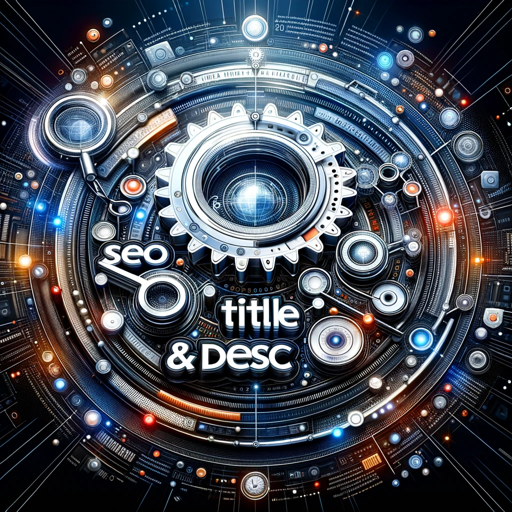Meta Tags Optimizer-SEO optimization for HTML pages
AI-powered tool for seamless SEO optimization
Analyze my article
Can you help me with my meta tags?
Get started
How do I improve my SEO?
Related Tools
Load More
SEO Optimizer
I craft SEO magic for content!

SEO Meta Title and Meta Description Tool - SERP
Specialist in creation and optimization of meta titles and meta descriptions for SEO, with focus on SERP.

SEO Magic
GPT created by Max Del Rosso, specialising in the analysis and optimisation of SEO content. This tool develops targeted content strategies and advises on best practices for structuring articles to maximise visibility and ranking in search engine results p

SEO Title Optimizer
Optimizes SEO titles for web pages using a 3-step analysis process.

SEO Meta Wizard
Generates 3 SEO meta titles & descriptions

SEO Meta Tag Generator
Instantly generate SEO-optimized titles and meta descriptions from webpage links or content.
20.0 / 5 (200 votes)
Introduction to Meta Tags Optimizer
Meta Tags Optimizer is a specialized tool designed to enhance the search engine visibility of web pages by analyzing, refining, and optimizing meta tags and other SEO-related HTML elements. Its primary goal is to help users improve their on-page SEO by ensuring that their HTML structure is in alignment with search engine best practices, which in turn boosts rankings, visibility, and click-through rates. The Meta Tags Optimizer works by auditing key HTML elements like title tags, meta descriptions, header tags, and alt text for images, ensuring that each of these components is optimized for both user experience and search engine crawlers. For example, in an e-commerce website selling electronics, Meta Tags Optimizer would audit and recommend improvements to product pages to ensure that meta tags, alt text, and titles are keyword-optimized and structured for better discoverability in search engine results. This ensures higher visibility for terms like 'best noise-cancelling headphones' while also maintaining relevance and user engagement.

Key Functions of Meta Tags Optimizer
Meta Tag Auditing
Example
Meta Tags Optimizer reviews the meta titles and descriptions of a blog post on a fitness website to ensure the title includes a target keyword like 'best home workouts' and that the description is under 160 characters while including a call to action.
Scenario
A fitness blogger uses Meta Tags Optimizer to ensure their meta tags are concise, keyword-rich, and properly structured, leading to improved search rankings and better click-through rates from users searching for fitness advice.
Title and Header Tag Optimization
Example
Meta Tags Optimizer checks the headers (H1, H2, H3) of an article about digital marketing trends to ensure there’s proper use of keywords in headings and a clear hierarchy.
Scenario
A digital marketing agency writes in-depth articles on SEO trends, and the optimizer ensures that the title and header tags are structured for maximum SEO benefit by including relevant keywords and maintaining a logical content hierarchy.
Alt Text Optimization for Images
Example
Meta Tags Optimizer identifies missing or non-optimized alt text in product images on a fashion retailer’s website and suggests keyword-rich descriptions like 'blue denim jacket with hood'.
Scenario
An e-commerce fashion store uses the tool to ensure that all product images have alt text, not only improving accessibility but also boosting the image's discoverability in search engines like Google Images.
Ideal Users of Meta Tags Optimizer
SEO Professionals and Agencies
SEO experts and agencies often manage multiple websites or clients, and Meta Tags Optimizer helps them streamline the process of auditing and optimizing on-page SEO elements like meta tags, headers, and image alt texts. These users benefit from the tool’s detailed analysis and actionable insights, which allow them to improve rankings quickly across a portfolio of websites.
Content Creators and Bloggers
Content creators and bloggers often write posts but may not be fully versed in SEO best practices. Meta Tags Optimizer helps this group by providing straightforward recommendations to ensure their content ranks well for target keywords, thereby increasing organic traffic to their blogs or websites.

How to Use Meta Tags Optimizer
1
Visit aichatonline.org for a free trial without login, also no need for ChatGPT Plus.
2
Upload or paste the HTML code of the article or web page you want to optimize.
3
Run the analysis to automatically scan meta tags, headers, alt text, and other SEO elements in the HTML.
4
Receive detailed feedback on SEO best practices, including suggestions for improving title tags, meta descriptions, keyword density, and more.
5
Implement the suggested changes in your HTML and re-run the optimizer to ensure maximum SEO performance.
Try other advanced and practical GPTs
HTML Tags Improver
AI-powered tool for generating SEO-friendly meta tags

Create a good Youtub title, description, and tags
AI-powered tool for optimized YouTube titles and tags

Tags GPT
AI-powered tag generation for better content visibility

Corporate Finance
AI-driven solutions for corporate finance challenges

Coach Inspire
Empower your growth with AI insights

Catchy Creator
AI-powered one-liners that stick

Photo editing expert
AI-Powered Professional Photo Editing

Smart Image Editing
AI-driven image creation and editing

Financial Analyst
AI-Powered Financial Analysis and Strategies

Financial Mathematician
AI-Powered Financial Analysis Tool.

Your StoryBrand
AI-powered marketing clarity for brands

Think like Steve JobsAI
AI-driven insights inspired by Steve Jobs.

- E-commerce
- Web Development
- Blogging
- Content Marketing
- SEO Audits
Q&A about Meta Tags Optimizer
What does Meta Tags Optimizer analyze?
Meta Tags Optimizer evaluates key SEO elements in HTML, including title tags, meta descriptions, header tags (H1, H2, etc.), alt text for images, internal and external links, and keyword usage. It also provides recommendations to enhance each aspect for better ranking.
Is Meta Tags Optimizer suitable for beginners?
Yes, Meta Tags Optimizer is designed with both beginners and experts in mind. Its straightforward interface makes it easy to use without deep technical knowledge, while advanced users can fine-tune specific SEO components for optimal results.
How often should I use Meta Tags Optimizer?
You should use Meta Tags Optimizer every time you publish new content or make significant updates to existing pages. Regular checks ensure that your content remains optimized for the latest SEO algorithms and trends.
Can I optimize multiple pages at once?
Currently, Meta Tags Optimizer analyzes one page at a time. You can upload or paste the HTML of each page individually for optimization. Future updates may include batch optimization features.
What are the benefits of optimizing meta tags?
Optimizing meta tags improves your site’s visibility on search engines, leading to higher click-through rates. Meta tags help search engines understand the content of your page, which can result in better rankings and more targeted traffic.